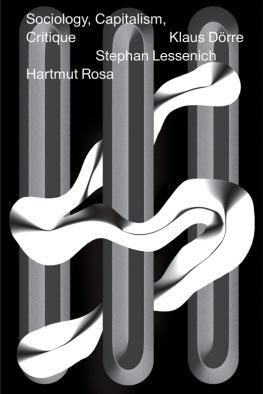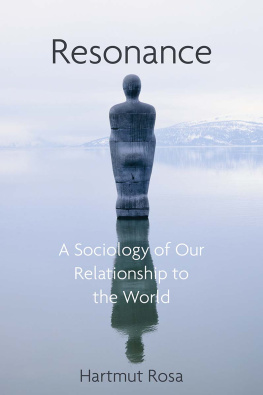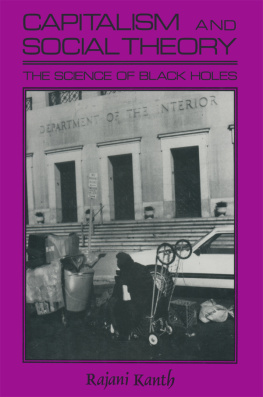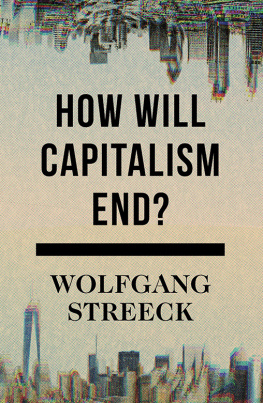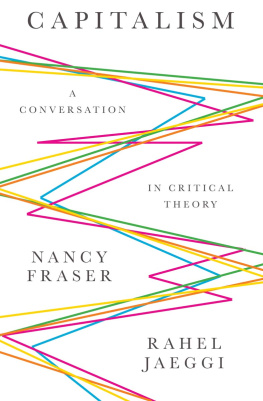As Klaus Schwab, founder of the World Economic Forum in Davos, claimed in 2012, Capitalism in its current form does not fit our world. More generally, it seems that a certain uneasiness regarding capitalism as such has even reached the social elites. This appears to pose a fitting occasion for a critical sociology. Yet when this book was published in its original German edition in 2009, causing great debate among German sociologists, a sound, scholarly critique of capitalism was in fact lacking. Indeed, sociology was ill prepared for the financial and economic crisis of 20082009. Analysis and critique of capitalism had remained confined to the shadows, at least in the German-speaking world. If capitalism was mentioned at all, it was spelled out in the plural while its divergent institutional varieties were dissected. The systemic commons of this social formation was largely ignored analytically.
Our book aims to re-ignite the debate. Yet it is also directed at non-sociologists interested in the anatomy of capitalist societies, their crises and the chances of a post-capitalist transformation. The authors proceed from one common point of departure: modern capitalisms constitute dynamic growth societies. Their relative stability throughout numerous crisis periods rested on economic-technological efficiency and growing material prosperity. A break in this continuity, however, is now occurring in the guise of an economic-ecological double crisis. There is a growing discrepancy between economic growth and general levels of prosperity. Economic growth itself has become a driving force of crisis. For sociology, this raises a question about the mutual interrelations between dynamic self-stabilisation and the principles of legitimation of modern capitalist societies. Our hypothesis reads that the logic of increase and escalation, consisting of an endless chain of Landnahmen, accelerations, and activations, may have in fact passed a critical threshold at which capitalist modernitys dynamisation imperatives themselves are being questioned. This fundamental assumption represents the common theme of the following sociological debate. The book starts off with three introductory chapters presenting the key concepts in our respective analyses of capitalist dynamics: Landnahme, acceleration, and activation. These are followed by criticisms and ripostes by each of the three authors, respectively.
Five years after the first publication of the German edition of this book, European capitalisms have not left the socio-economic crisis behind, not even remotely. Due to unemployment and economic stagnation, ecological threats such as climate change are either being ignored or fatalistically accepted. Moreover, the crisis in Ukraine has re-ignited the cold war between East and West, while the Arab Spring has not only deposed despots, but also created a power vacuum that is being filled, at least partially, by Islamic fundamentalists. However, despite all the crises and convulsions, the capitalist elites seem to be running a tight ship, at least in the historical centres. The year of 2011 saw social movements emerging in opposition to market fundamentalism. Yet with the exception of those Latin American countries with centre-left governments, democratic anti-capitalist political forces are weaker than ever. In fact, currently, it seems more likely that far-right and right-wing populist formations could be successful in instrumentalising widespread dissatisfaction to pave the way towards a new authoritarianism.
While the world stumbles from one crisis to the next, the social sciences largely confine themselves to business as usual. Once again, economists have outpaced sociologists. While Thomas Pikettys hypothesis of permanently growing wealth inequality due to capitalism is being debated all over the world, the German Wirtschaftsweise (economic wise men) remain convinced that the heterodox economist has shot himself in the foot.Given that we are particularly interested in the global commonalities of capitalist socialisation (Vergesellschaftung), however, we hope that our discussion proves stimulating for readers from the Anglo-Saxon world and beyond, too.
Klaus Drre, Stephan Lessenich, Hartmut Rosa,
December 2014
___________
Klaus Schwab on 24 January 2012, as reported by German news channel n-tv.
Franziskus und die Globalisierung, Was der Papst verschweigt, in Frankfurter Allgemeine Zeitung, 29 November 2013.
. Accessed: 01 December 2014. This statement comes from the neo-Keynesian Bofinger, of all people.
Introduction:
Sociology Capitalism Critique:
Towards the Revitalisation of an
Elective Affinity
We Are All Socialists Now.
Newsweek, 16 February 2009
Wherever you look these days, the critique of capitalism has all of a sudden become quite fashionable. You could get the impression that critiques of the system, which for a long time had been confined to marginal or fringe groups (among for instance social milieus such as students, unionists, and veteran libertarians), and lately seemed to have found their (anti-)institutional home within the alt-globalisation movement, have now made their way into the social mainstream. Whether in the review section of major newspapers or in the catalogues of prestigious publishing houses, from Heiner Geilers invectives against globalisation to Josef Ackermanns self-incriminating public statements, in this country, anyone keen to go with the times is distancing themselves from capitalism. Even if this condemnation is moralistic, everyone feels obligated to disassociate themselves from the dysfunction and crises of capitalisms latest neo-liberal phase of development. The reader of this book may rightly ask herself at the beginning of this intellectual endeavour: why another tirade against capitalism? Why another book on what is by now a very obvious crisis? Do we really, now that everyone is having a go at the toppled giant, also want to join the fray?

